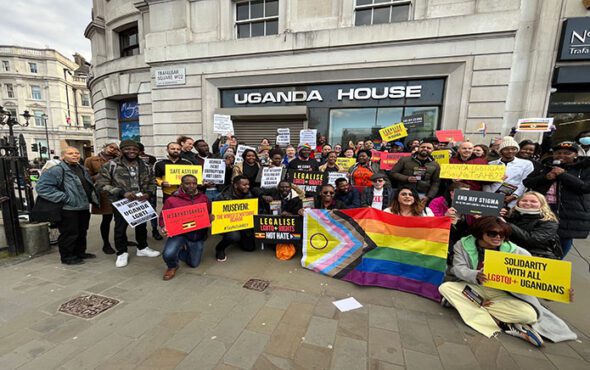
LGBTQ+ activists and groups have gathered in London to protest Uganda’s Anti-Homosexuality Bill.
On 25 April, tens gathered holding a peaceful demonstration outside the Uganda House in Trafalgar Square, London to demonstrate their opposition to the country’s Anti-Homosexuality Bill.
Amongst the bill’s punishments for “homosexual activity”, the legislation imposes the death penalty for being gay, threatens up to 14 years for what it describes as “attempted” homosexuality, and 20 years for “recruitment, promotion and funding” of same-sex “activities”.
Despite the bill’s cruel threats to criminalise LGBTQ+ activity, Ugandan president, Yoweri Museveni has returned the bill back to Parliament, refusing to sign it and instead demanding that the bill be made even harsher.
With the bill in motion, LGBTQ+ activists and groups from Uganda and around the world are campaigning for international allies to apply pressure through political, diplomatic, economic and public means on the Museveni administration to “kill” the bill.
@gaytimes Protesters gather to fight Uganda’s Anti-Homosexuality Bill ✊🏿✊🏾✊🏽 #uganda #ugandantiktok #lgbtqnews #lgbtqpolitics #ugandagaylaw #protest #gayrights #lgbtrights #lgbtqrights ♬ [News coverage] Inorganic: Flat: 12(1011945) – 8.864
Gathering to apply such pressure in London on 25 April, organisations including UK Black Pride, Rainbow House, Rainbow Migration, Peter Tatchell Foundation, and Living Free UK, gave speeches for LGBTQ+ freedom in Uganda outside the country’s embassy.
GAY TIMES spoke to two activists at the protest, Moud Goba, Chair of the Board of Trustees at UK Black Pride and National Manager at Micro Rainbow, and Dan Yomi, Founder and Director of Living Free UK and Director at House of Rainbow.
“We need this bill to be killed,” Goba told GAY TIMES. “Ugandan LGBTQI people are living in fear, they are being persecuted. This bill needs to go.”
Discussing the dual action of protestors around the world, including in New York City, Yomi said groups are “sending a message to President Museveni to do the sensible thing and speak up for one of the most marginalised communities in Uganda.”

Hollie Wong



